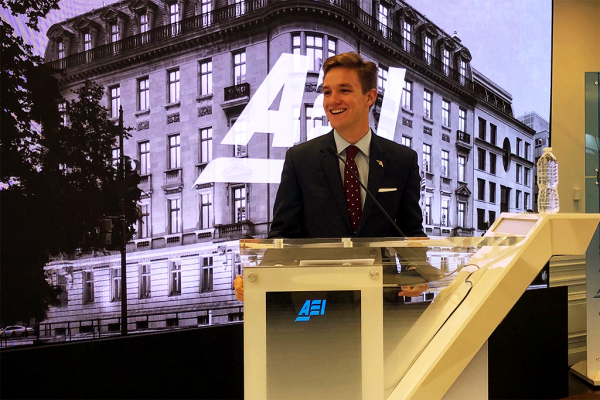From Notebooks to Neckties: Liberal Arts in the Professional World

It’s hard to believe, but I’m halfway through college. By now, I’m accustomed to thinking of summer not as a vacation, but as its own semester, an opportunity to learn about the working world. On my commute I sometimes check social media and see folks on holiday, but I’m not the poolside type. I know that if I were there, I would rather be here: enrolled in “Professional World 101,” interning at the American Enterprise Institute (AEI), a nonpartisan think tank in Washington, D.C. Midway through summer, my chief insight into the professional world has been the value of a liberal arts education.
Too often, positions turn people into applications. Every spring, as Kenyon students begin applying for summer internships and jobs, it’s easy to think, “We are all resumes now.” Assuming each school is graduating many great resumes, with more and more entering the job market every year, it’s easy to go to a dark place. (“Why should anyone hire me?”) A Kenyon graduate has an invaluable advantage in answering that question. As a student of liberal arts, I know who me is.
To “know thyself” is an ancient command, and from Athens to Rome to American college campuses, students of the liberal arts have spent their four years studying toward that goal. It is inscribed on the Oracle of Delphi and was restated by Socrates: “The unexamined life is not worth living.” We could talk for years about what he meant — indeed, Socrates spent his entire adult life talking — and even today, the liberal arts compel students to respond, reflect, and refine our understanding of who we’ve been, who we are, and who we intend to be. All that’s to say, I carry with me off campus what I’ve learned at Kenyon. Self-knowledge is both personally edifying as I live my life and a comparative advantage as I begin my career.
The first advantage of knowing thyself? I more easily recognize those roles in which I’d excel and organizations to which I can proudly contribute. Last year, that self-understanding in fact kept me out of D.C. — I went home to California to spend the summer months in the classroom, both a sidestep of today’s shouting-match politics and a test run of the teaching skills I hope to use someday — and this year, it helped me find one of the brightest spots in Washington, an island in the shouting storm, a scholarly outfit dedicated to “defending human dignity, expanding human potential, and building a freer and safer world.” At AEI I research civic education and veterans’ “second service” in elected office after their time in the military. I make friends of all political stripes. And all the while, I do what I can to keep ordinary folks and the Midwest in this town’s mind. In researching policy and reaching people, I find I’m prepared well by my liberal education.
When an interviewer asks me, “Why are you applying for this job?” my best responses relate me personally to the position and the organization. I can only do so compellingly if I’m doing so honestly, which requires truly knowing myself — what are my first principles and core interests? My strengths? Weaknesses? The best answers stem from the most frank self-appraisal. Because I know myself, I’m sure of myself; because I follow my heart to each opportunity, I interview with confidence in my aims and my value.
I’ve written before about our Ohio location and Midwestern community as essential to my intellectual and moral growth, but I’ve not yet given the Hill its due as preparation for professional life. Intentionally founded apart from the bustle of the cities and the noise of the everyday, Kenyon is nearly unrivaled as an opportunity for liberal education. The “hard” skills we acquire almost go without saying: You will leave here knowing how to read and write well. The “soft” skills, too — self-knowledge and self-confidence — go unsaid, but not unseen: among the countless 20-somethings who descend on Washington every summer, with vague ideas of wanting to work ‘in politics,’ it helps to want to do something for rather than want something from.
It’s too easy to forget that at the end of our lives, we won’t wish we’d made more money or attained that fancy title. My liberal education reminds me every day that living a good life is primary, and career secondary. Once you know what’s fundamentally important to your happiness, that becomes your focus. This sense of purpose has been the best preparation for professional life. More than simply set you up to work, the liberal arts set you up to live well.
